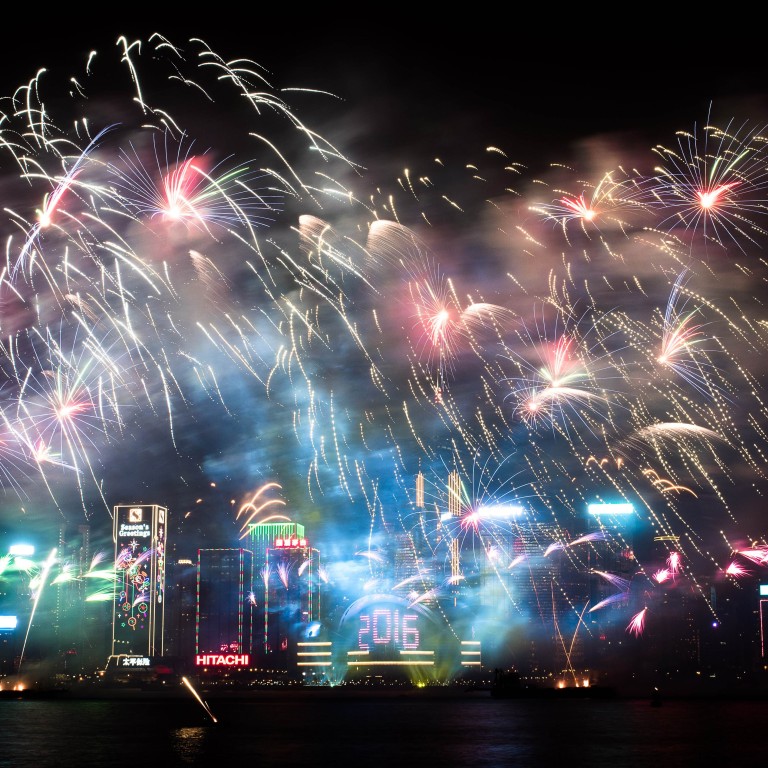
For mainland China, Hong Kong and Taiwan, 2016 will bring great challenges and opportunities
The authorities will have to address political and economic uncertainties during a year of leadership changes around the world
The new year does not close the book on the old. Two recent landmark events in Paris set contrasting tones for 2016 – optimism sparked by a positive outcome to last month’s world climate summit, tempered by the horror of November’s terrorist attack that killed 130 people. They set the stage for 2016 to be the year the world must cooperate to confront the reality of global warming and the threat to world order of violent extremism.
Even without these challenges, 2016 would remain a defining year, with a rising interest-rate cycle amid a slowdown in China, the election of a new US president, the first elections for the Hong Kong legislature since it rejected political reform proposals, elections in Taiwan next month that are expected to return the pro-independence opposition to power, and the National People’s Congress and Chinese People’s Political Consultative Conference in March, which will consider detailed measures to ensure stable economic growth.
Domestically, President Xi Jinping (習近平) needs to deepen his anti-corruption campaign while dealing with the economic slowdown; externally, he faces a more complicated international environment amid leadership changes and continuing tensions in the South China Sea.
Elections here and abroad
In the US, Democratic Party front runner Hillary Clinton is no stranger to Beijing and other world capitals, unlike the field of candidates for the Republican nomination. Front runner Donald Trump has confounded conventional notions of credibility with an unpresidential image shaped by offensive remarks about migrants and women and insultingly undiplomatic criticism of China. That said, the eventual nominee often leaves such rhetoric behind on the campaign trail, and China- bashing is a well-established standby for US election candidates seeking to lay the blame for America’s problems.
In Taiwan, President Ma Ying-jeou’s policy of opening up to the mainland is not seen to have improved the lives of ordinary people, and his historic meeting with Xi has not dented Democratic Progressive Party candidate Tsai Ing-wen’s lead in the polls. This has enabled her to put cross-strait relations to one side, pledging adherence to the “status quo” and focusing on social and economic “justice”. But ultimately her success as president will depend on developing a framework for managing relations with mainland China.
Locally, the assessment is not upbeat. Global conditions are likely to constrain the city’s economic performance. The dent in the retail and other sectors caused by a downturn in tourist arrivals may put pressure on the labour market. The US Federal Reserve’s rate rise has also clouded the volatile residential property market. Social sentiment is equally unsettling. The public continues to be bombarded with vexed questions like inadequate housing supply, an ageing population, retirement protection and standard working hours legislation. Negative sentiment towards mainlanders my have eased with fewer arrivals, but remains cause for concern.
Politically, the city’s fate for the next few years will be sealed when it returns a new legislature and the election committee for the chief executive poll towards the end of the year. It remains to be seen whether political forces in the new Legco will be realigned to make governance easier. More than a year has passed but the wounds opened by the political reform row and the 79-day Occupy protests have yet to heal. What is certain, though, is that governance in the coming months will become more difficult. Previous experience has shown that a wrong step by the government could become an election issue.
Thanks to the Hong Kong dollar’s peg to the greenback and the beginning of a rate-rise cycle, analysts expect local interest rates to rise by 1 percentage point this year, despite the prospect of an economic slowdown. This would lead to potential capital outflow from the stock and property markets of up to US$130 billion in “hot money”.
With the Hong Kong-Shanghai stock connect scheme now more than a year old, the long-awaited scheme between Hong Kong and Shenzhen is expected to launch in the first half of the year, creating more cross-border trading and capital flows.
Going for gold
The Olympic Games in Rio de Janeiro in August may bring welcome relief from human conflict, politics and economic uncertainty. Hong Kong’s brightest medal prospects lies with the city’s cycling sweetheart Sara Lee Wai-sze, a bronze medallist in London four years ago. Other chances rest on the shoulders of Siobhan Haughey, who became the first swimmer from Hong Kong to reach the Olympic qualifying standard in more than half a century at the world championships this year, and runner Christy Yiu Kit-ching, who qualified for Rio when she set her personal best in the Prague Marathon in May.

